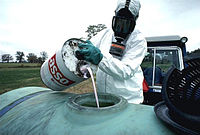Environmental impact of pesticides

Pesticides are special chemicals that farmers use to help protect their crops from insects and other pests. They can be sprayed on the plants, mixed into the soil or even applied as seeds before planting. While pesticides can be really helpful, they can also have an impact on the environment.
First, let's imagine that our garden is full of bugs that want to eat our plants. We don’t want to use pesticides because they can harm other creatures that are beneficial to the garden, like bees and earthworms. So, we decide to keep the pests at bay by planting certain plants that the bugs don't like, such as marigolds and lavender.
However, farmers often need to use pesticides to protect their crops from pests in huge fields. While spraying pesticides, some of them might land on the ground or be carried away by the wind or rain. These pesticides can harm other living things in the soil, such as worms and microorganisms, that are essential for plant growth.
Pesticides could also end up in nearby rivers or streams where they can harm aquatic organisms like fish and frogs. This can upset the balance of the ecosystem and lead to a decline in the number of animals living in the water.
In addition, other creatures might eat the crops that have been sprayed with pesticides, and this can result in the accumulation of chemicals in their bodies, that might not only make them sick but can also affect humans if the animals are hunted for food.
That's why it's very important to be careful when using pesticides in the environment. Farmers should use them judiciously and follow the instructions carefully, so that crops are protected from pests without harming the ecosystem, and the consumers of the crops are not affected by the chemicals.
First, let's imagine that our garden is full of bugs that want to eat our plants. We don’t want to use pesticides because they can harm other creatures that are beneficial to the garden, like bees and earthworms. So, we decide to keep the pests at bay by planting certain plants that the bugs don't like, such as marigolds and lavender.
However, farmers often need to use pesticides to protect their crops from pests in huge fields. While spraying pesticides, some of them might land on the ground or be carried away by the wind or rain. These pesticides can harm other living things in the soil, such as worms and microorganisms, that are essential for plant growth.
Pesticides could also end up in nearby rivers or streams where they can harm aquatic organisms like fish and frogs. This can upset the balance of the ecosystem and lead to a decline in the number of animals living in the water.
In addition, other creatures might eat the crops that have been sprayed with pesticides, and this can result in the accumulation of chemicals in their bodies, that might not only make them sick but can also affect humans if the animals are hunted for food.
That's why it's very important to be careful when using pesticides in the environment. Farmers should use them judiciously and follow the instructions carefully, so that crops are protected from pests without harming the ecosystem, and the consumers of the crops are not affected by the chemicals.
Related topics others have asked about:
